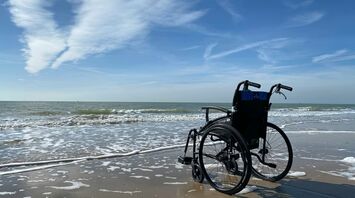$2.5M Grant Aims to Enhance Air Travel Safety and Dignity for Wheelchair Users

Air travel, while challenging for many, poses significant hurdles for passengers who use wheelchairs or mobility aids. Addressing these challenges, a $2.5 million grant has been awarded to a research team led by Indiana University’s Department of Health and Wellness Design. This five-year study aims to improve the safety and dignity of air travel for passengers with mobility limitations through standardized training programs and inclusive solutions.
Tackling Barriers to Mobility-Friendly Air Travel
The research, spearheaded by Professor Shu Cole, focuses on the barriers faced by travelers with disabilities, particularly those using wheelchairs or walkers. Cole emphasizes that damage to mobility devices, such as custom wheelchairs, not only disrupts travel plans but also creates psychological stress and financial strain. Last year alone, U.S. airlines lost or damaged over 11,000 wheelchairs, according to the Department of Transportation (DOT).
The study will identify physical, psychological, and social barriers that passengers with disabilities encounter. The goal is to develop standardized training for airline employees, enhancing their ability to assist passengers with mobility challenges. "When workers are poorly trained or equipped, the result can be physical injuries and stress for passengers," Cole said. The project aims to provide practical, adoptable recommendations for airlines to improve services.
Industry Collaboration and Economic Benefits
The research team, including experts like Simon Darcy from the University of Technology Sydney and Eric Lipp of Open Doors Organization, seeks to collaborate with airlines rather than criticize them. Darcy, a global advocate for inclusive practices and frequent wheelchair traveler, highlighted the need for trained staff and specialized equipment to ensure smooth boarding and safety for passengers. Poorly handled situations, he noted, can result in injuries, as happened to him on a recent international flight.
Lipp, who leads Open Doors Organization, pointed out the economic incentive for airlines to improve services for passengers with disabilities. According to his organization’s study, disabled adults took over 25 million flights in two years, generating $10 billion in revenue. Encouraging these passengers to fly more frequently could significantly boost the aviation industry's earnings.
Standardizing Training for Sustainable Solutions
The study will also explore how airlines can better handle mobility devices and ensure compliance with DOT regulations. Recent federal initiatives, such as requiring airlines to notify passengers immediately about damaged wheelchairs and mandating repair or replacement, underscore the importance of addressing these issues.
Cole and her team aim to make their findings accessible to aviation companies. "The purpose is to create practical, standardized solutions for training staff, reducing barriers, and making air travel more inclusive," Cole said. The researchers hope their work will lead to long-term changes that benefit both passengers and airlines.



















